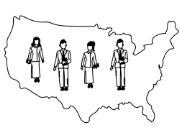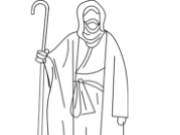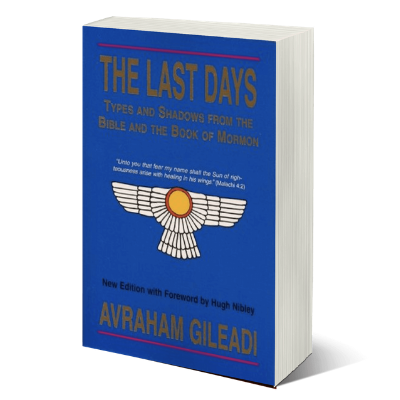Nephi Quotes Isaiah Chapters When Forbidden to Say More
Like Isaiah, Nephi saw in vision to the end of time (1 Nephi 11–14). He beheld his descendants multiply and prosper in the land of promise and finally rebel against God and perish. He saw the Gentiles come to this land and smite and scatter the Lamanites until only a remnant was left.
After seeing the restoration of the gospel and the times of the Gentiles fulfilled, Nephi is told that Jesus’ apostle John will reveal the rest of what the angel of God will show him about the end of the world (1 Nephi 14:24–25). Nephi himself, however, is not to write those additional things.
1 Nephi 14:28
I, Nephi, am forbidden that I should write the remainder of the things which I saw and heard; wherefore the things which I have written sufficeth me; and I have written but a small part of the things which I saw.
So as not to seem obvious about what more he might say about what he was forbidden to write, Nephi returns to describing the families’ journey to the land of promise (1 Nephi 16–19). He knows that their exodus out of Jerusalem is a type of Israel’s end-time exodus out of Babylon.
As his brothers inquire of him about their father’s vision—typifying God’s end-time servants’ inquiring about Isaiah’s vision (Isaiah 52:15)—Nephi, prefaces his account of their journey to the land of promise by saying, “I did rehearse unto them the words of Isaiah” (1 Nephi 15:20).
Only after he has laid this groundwork for quoting Isaiah directly does Nephi copy chapters 48–49 in their entirety. That those passages cover some of the things he was forbidden to reveal—including a prophecy about Israel’s end-time exodus out of Babylon—should not go unnoticed.
Isaiah 48:20–21; 1 Nephi 20:20–21
Go forth out of Babylon, flee from Chaldea!
Make this announcement with resounding voice;
broadcast it to the end of the earth.
Say, Jehovah has redeemed his servant Jacob.
They thirsted not when he led them through arid places:
he caused water to flow for them from the rock;
he cleaved the rock and water gushed out.
Knowing that his readers will include the spiritual kings and queens of the Gentiles who will restore the house of Israel suits Nephi’s further purpose of defining his brothers’ hardening of their hearts as “not inquiring for themselves.” That too, Nephi knows, typifies the end-time.
1 Nephi 15:8–11
I said unto them: Have ye inquired of the Lord? And they said unto me: We have not; for the Lord maketh no such thing known unto us. Behold, I said unto them: How is it that ye do not keep the commandments of the Lord? How is it that ye will perish, because of the hardness of your hearts? Do ye not remember the things which the Lord hath said?—If ye will not harden your hearts, and ask me in faith, believing that ye shall receive, with diligence in keeping my commandments, surely these things shall be made known unto you.
In the two Isaiah chapters Nephi quotes (Isaiah 48–49), Isaiah chastens God’s end-time people for not searching his words and inquiring for themselves. While they may assume they know the scriptures, they have woefully ignored and lack understanding of Isaiah’s end-time revelation.
Isaiah 48:6–7; 1 Nephi 20:6–7
You have heard the whole vision;
how is it you do not proclaim it?
Yet as of now, I announce to you new things,
things withheld and unknown to you,
things now coming into being, not hitherto,
things you have not heard of before,
lest you should say, Indeed I knew them!
In the midst of his end-time people’s ignorance, God intervenes by sending his servant who was hidden from the world to reveal the new things before it is too late. If they had perceived Isaiah’s prophecy for what it is, they would have been forewarned of events now bursting in on them.
Isaiah 49:1–2; 1 Nephi 21:1–2
Hear me, O isles; listen, you distant peoples:
Jehovah called me before I was in the belly;
before I was in my mother’s womb,
he mentioned me by name.
He has made my mouth like a sharp sword—
in the shadow of his hand he hid me.
He has made me into a polished arrow—
in his quiver he kept me secret.
By hiding his servant until he calls him—even from his other servants—God tries their faith and weeds out his opponents. These fall prey to the servant’s “sharp sword” and “polished arrow” and are ultimately “cut off from among my people who are of the covenant” (3 Nephi 21:11).
As God’s arm of Righteousness, who is “bared” or revealed just before the end comes (Isaiah 52:10), the servant makes short work of God’s enemies among his people who are entangled in Babylon. His foretelling the truth and it comes to pass is a sign that he is sanctioned of God.
Isaiah 48:14–15; 1 Nephi 20:14–15
All of you, assemble and hear:
Who among you foretold these things?
It is him Jehovah loves,
who shall perform his will in Babylon;
his arm shall be against the Chaldeans.
I myself have spoken it, and also called him;
I have brought him, and I will prosper his way.
As he who “restores all things” (Matthew 17:11; Doctrine & Covenants 77:9, 14), the servant gathers Israel’s scattered tribes and reconstitutes them as a covenant people of God. As a light to the Gentiles, he prepares the way for Jehovah’s coming to reign as Salvation (Isaiah 62:10–12).
Isaiah 49:6; 1 Nephi 21:6
He said: It is too small a thing
for you to be my servant
to raise up the tribes of Jacob
and to restore those preserved of Israel.
I will also appoint you to be a light to the Gentiles,
that my salvation may be to the end of the earth.
Right after quoting Isaiah 48–49, Nephi again picks up the thread of Israel’s restoration. Without directly mentioning the mission of God’s servant, he does so indirectly by explaining additional Isaiah passages (1 Nephi 22:1–24) and then reiterating he is under constraint to say no more.
1 Nephi 22:25, 29
And he gathereth his children from the four quarters of the earth; and he numbereth his sheep, and they know him; and there shall be one fold and one shepherd; and he shall feed his sheep, and in him they shall find pasture. . . . And now I, Nephi, make an end; for I durst not speak further as yet concerning these things.
From the two Isaiah chapters Nephi quotes, we thus observe that what he is forbidden to write has a lot to do with the role of God’s servant in relation to Israel’s end-time restoration. By preventing Nephi from explicitly depicting those things, God chose to test his people in that day.
John prophesies God’s end-time servant within the context of the Woman Zion’s fleeing into the wilderness. When the Dragon persecutes her, she delivered a son, who becomes her deliverer. Like Moses, who freed Israel from pharaoh, Egypt’s Dragon, the servant frees the Woman Zion.
Revelation 12:4–6
The Dragon stood before the Woman who was ready to be delivered, to devour her child as soon as it was born. And she brought forth a male-child, who was to rule all nations with a rod of iron; and her child was caught up to God and to his throne. And the Woman fled into the wilderness, where she had a place prepared of God that they should feed her there a thousand two hundred and threescore days.
Those events parallel Isaiah’s prophecy of the Woman Zion who delivers a son just before God’s end-time Day of Judgment. In that day, a new nation of God’s people is born whom the servant gathers from among all nations to prepare them for Jehovah/Jesus’ coming (Isaiah 55:3–5).
Isaiah 66:7–8
Before she is in labor, she gives birth;
before her ordeal overtakes her, she delivers a son!
Who has heard the like,
or who has seen such things?
Can the earth labor but a day
and a nation be born at once?
For as soon as she was in labor,
Zion gave birth to her children.
Read More Key Book of Mormon Areas of Interest
Recommended Reading
& Listening
Avraham Gileadi, The Book of Isaiah: A New Translation with Interpretive Keys from the Book of Mormon. An unsurpassed beginner’s guide to the Book of Isaiah for LDS readers that blends testimony and scholarship to explain Isaiah’s writings. Hebron Books, 2012: 253 pages. Softcover $22.95; E-Book $8.95; MP3 $8.95.











